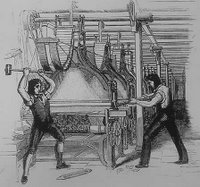Ned Ludd and His Luddites

The term "Luddite" refers to a person who advocates the destruction of labor-saving technology and a return to a primitive pre-technological society which perhaps never existed, but in England during the Industrial Revolution, the term had a much more specific meaning, referring to workers who protested wage reductions and unemployment by breaking machinery.
One of the main focal points of these activities was in the stocking industry. For 200 years, stocking-makers used a simple stocking frame in their work, but around 1750, a new stocking frame was introduced in factories which permitted manufacturers to make more stockings with less labor. As the implications of technological progress became clear to the stocking-makers, a radical vanguard of them sporadically took to smashing a number of new frames in protest throughout the latter half of the 18th century.
A child's legend arose in the milieu of the protests about a young Anstey stocking-maker's apprentice named Edward Ludlam who, having received a whipping from his father for mischief unknown, retaliated by breaking a couple of stocking frames; thus, whenever stocking-makers found a broken frame, they would joke that "Ned Ludd" must have been there. The protesters found a hero in Ned Ludd, and used the image of a fiery Anstey lad grown-up to drive home their fury. In 1811, as a kick-off to the most strident of Luddite crusades, manufacturers in Nottingham started to receive threatening letters from "General Ned Ludd and the Army of Redressers," followed swiftly by nighttime raids on factories during which 200 new stocking frames were broken.
The protests spread with popular support against the evils of newfangled technology -- despite rewards offered by the Prince Regent for the arrest and capture of the Luddites and the imposition of the death penalty for frame-smashing. (On hearing about the new penalty, Lord Byron made an impassioned plea for clemency for starving stocking-makers in his maiden speech in the House of Lords.) The Luddite protests reached their peak in June 1816, when an army of Luddites marched to Loughborough, destroyed 55 frames, and burned lots of socks. In the days following the Loughborough riot there were numerous arrests, followed by 7 well-attended hangings.
Nowadays, Luddites are more likely to hang out in used bookstores and make popcorn with oil on a stove and rarely smash things or burn socks. They escape hanging but not ridicule.
Labels: Labor History, Technology





0 Comments:
Post a Comment
Subscribe to Post Comments [Atom]
<< Home